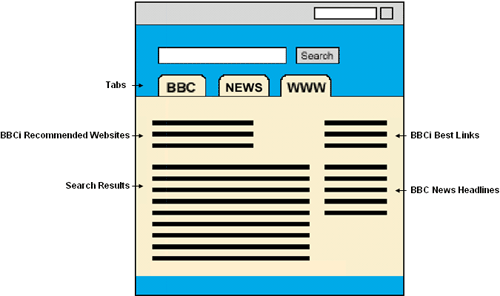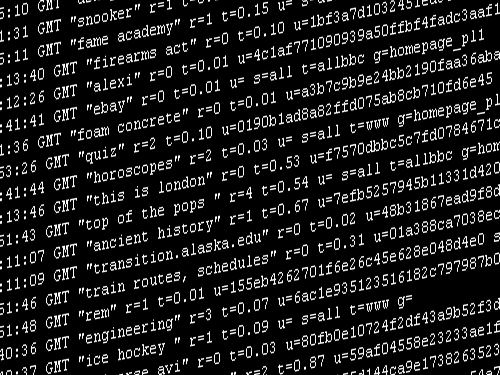Web search at the BBC: Part 8 - Editions of you
I've put together a series of posts looking at how the BBC developed their web search service. During 2002 and 2003 it was a strategic priority for the BBC New Media department, but earlier this year it was shut down.
Usability testing at Serco

Post-launch, in August 2002, Vincent Helyar & Kate Taylor at Serco produced another user testing report for the BBC about search. Some of their key findings were:
- The uncluttered layout of results pages was popular with users, as was the lack of advertising. Users were also positive about the benefits of having BBC content next to web content, though few users appreciated this without prompting.
- Users were generally not aware of the BBCi web search, and without exception stated that they would not think to come to the BBC site to carry out a web search.
- Several users expected that the BBCi web search might be more limited in scope than other web searches.
- Little attention was paid to tabs offering different kinds of results on the search results pages, and it was common for users not to notice them at all at first. Users also frequently missed the button offering 'UK results only.'
Another part of the usability test carried out by Serco for the BBC was to ask users their concept of how web search worked:
"At the end of the introductory phase of the usability evaluation, users were asked to describe what they thought went on behind-the-scenes of an Internet search. No users had ever considered such a question before, and generally found it quite difficult to answer. Responses from users included:
- 'It's like a great big filing cabinet, with all the names there electronically'
- 'They have to request to be listed...'
- 'some huge list of sites – the mind boggles when you think about it!'"
In 2002 Serco found that "Almost all users were asked initially to demonstrate a search that they had carried out recently on the Internet. Users went to the search engine they used most frequently, users in this research most often used Google". This was a distinct contrast to just a year previously, when research had shown that Google had been considered obscure, and Yahoo! and Ask had been the most used search engines by the test subjects.
Search and Editorial
Regardless of the merits of the concept of the BBC doing web search, I think the project played an important role in getting the BBC to take the concept of search seriously. As well as providing a global search option across bbc.co.uk for the first time, it helped sell the concept of search engine optimisation within the Corporation. It also helped focus minds on how search log monitoring could feed into editorial processes.

It was during the initial stages of the Iraq War that I think there was a realisation that search and the homepage editorial process needed to be brought closer together. An editorial meeting each day at Bush House during the conflict made sure that everybody was aware of what was due to be on the homepage, what BBC News were expecting to carry during the day, and therefore what search terms and links might be considered sensitive. As well as "Massive Attack" finding themselves off the Radio 1 play-list again, certain keywords found themselves barred from appearing on the homepage 'popular links' section.
One of the things I found interesting was that programme brands, personalities and some broad concepts made it easy to consolidate searches into a set of popular keywords. There was a huge variation, however, in the search terms that people used on the BBC site, and elsewhere, to search for information about the war in Iraq.
I worked on an algorithmic way of producing a list of terms that people were using to search for information, and helped deliver a design so that those were displayed on the BBC homepage as well.

Prawn patrol
Input was also required in keeping web search 'safe'. The BBC always took the 'cleanest' feed of web results from their web technology partners to provide results that were as free as possible from pr0n, race hate and otherwise unpleasant Internet content. An additional layer of editorial filtering was provided by the BBC's search team.
Firstly there was a set of words that were not permitted to be searched for. This caused some controversy, and I can remember letters in the BBC's in-house newspaper Ariel complaining that staff could no longer research 'blue tits' for a programme on ornithology using the BBC's search engine.
Secondly, the results for a whole range of potentially dangerous searches were regularly monitored. I built a system to help what came to be nicknamed 'prawn patrol'. This monitored the top 50 results being displayed for keywords like 'kylie minogue' or 'jews'. These were search terms that weren't in themselves dodgy or offensive, but that might give rise to results where people were attempting to peddle pr0n or anti-semitism. The system alerted staff every time a new page appeared in that top 50, so it could be checked.
In order to carry out the task of safeguarding users from unsavoury results, BBCi Search staff had to have a special dispensation form approved by their line manager to allow them to use the BBC's IT network to search and view pr0n.
The BBC therefore maintained an additional list of dubious URLs, which were blocked from results displayed on the BBC site. We used to joke that there might be a lucrative sideline in selling on what was basically a directory of officially BBC disapproved Internet filth.
Next...
Tomorrow, in the last part of this series, I want to explore what happened to BBC Search after I left the team, and look at how the future of the BBC's policy towards external links and content aggregation harks right back to future.